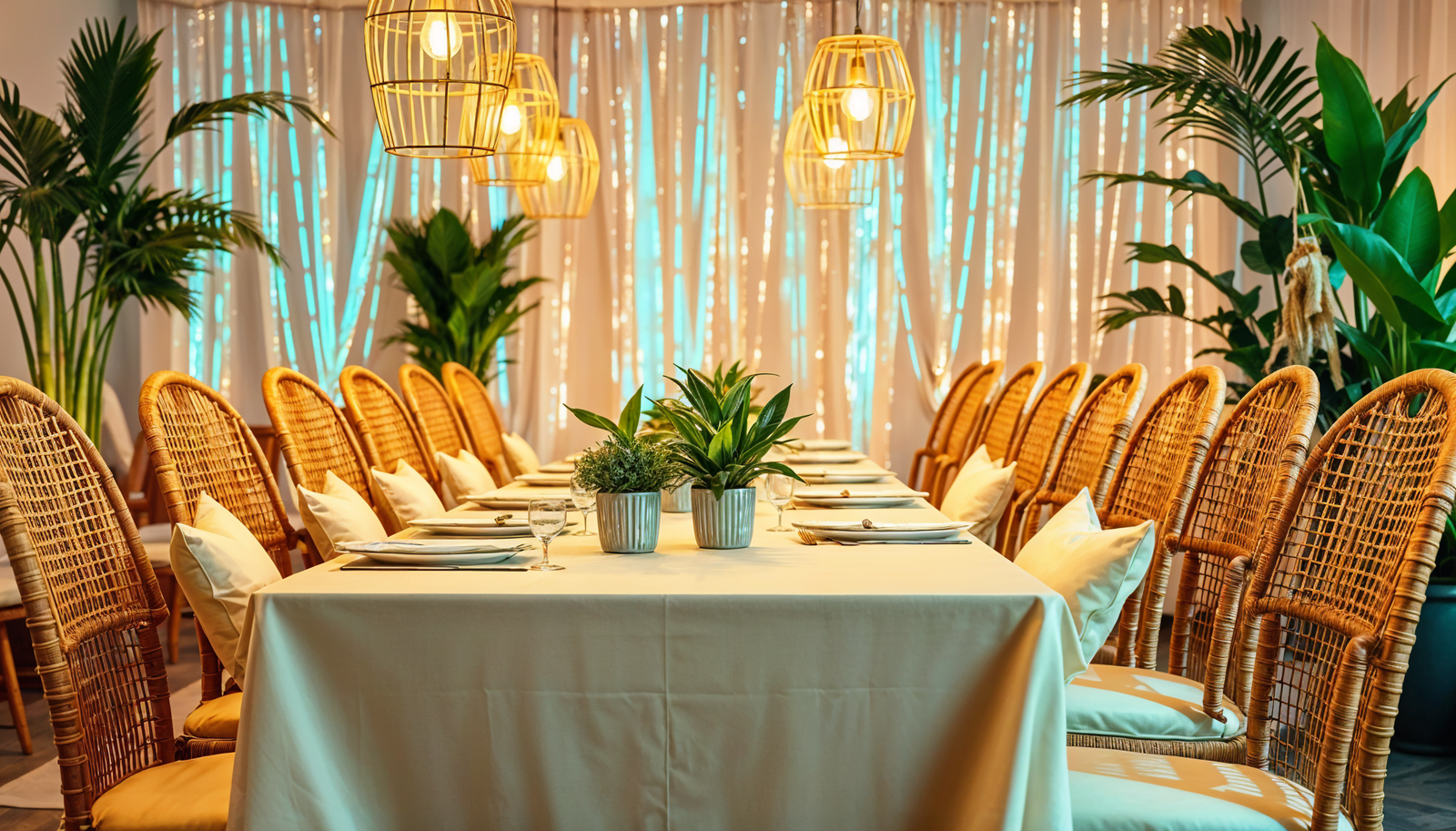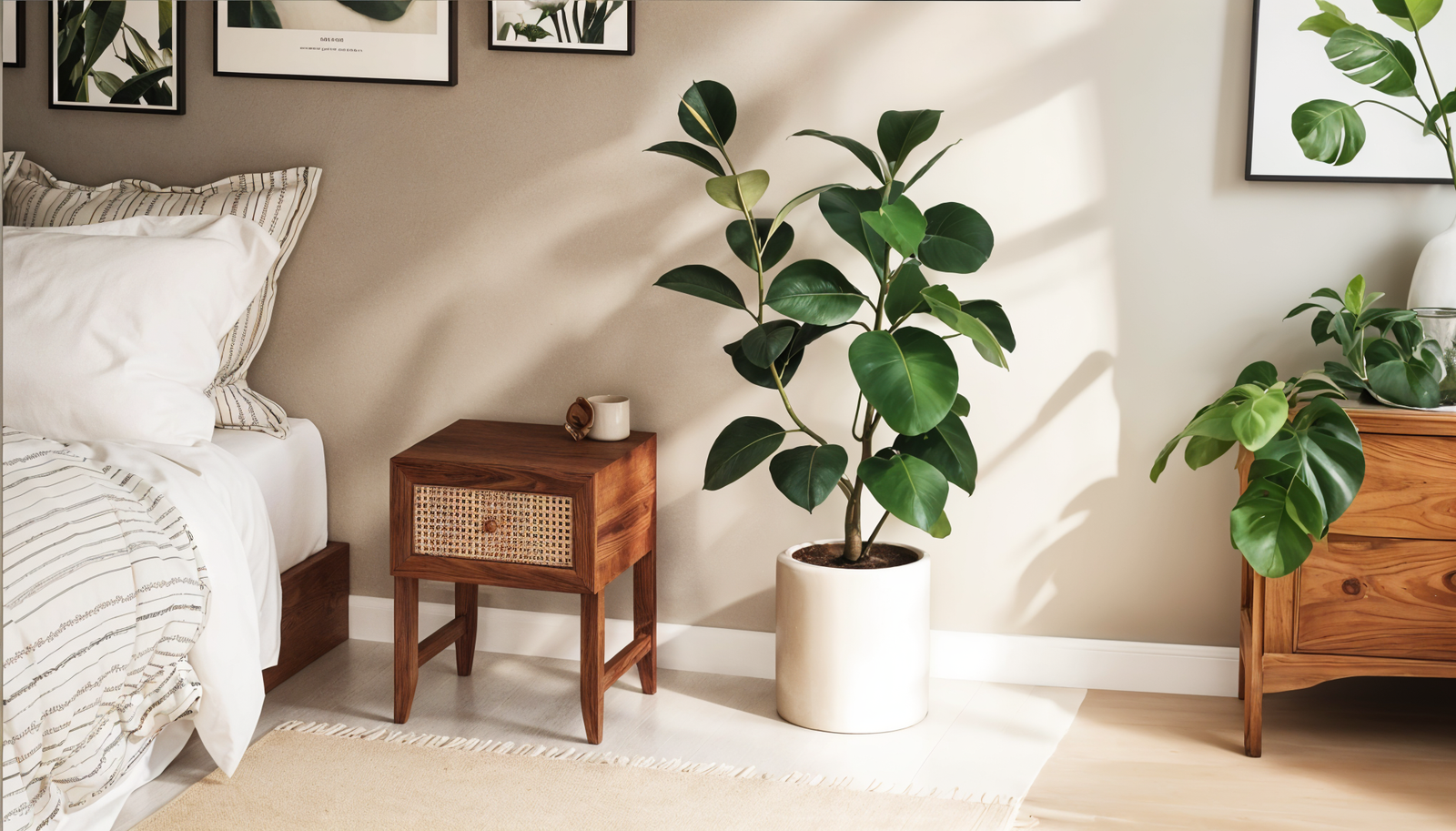🤍 Unmatched Quality, Authentic Craftsmanship
🤍 Unmatched Quality, Authentic Craftsmanship
🤍 Unmatched Quality, Authentic Craftsmanship
Welcome to our latest article on japandi must haves ideas. Incorporating the unique blend of Japanese and Scandinavian aesthetics, Japandi design offers a harmonious fusion of minimalism and functionality.
If you're seeking inspiration to transform your home into a serene and beautiful space, look no further.
In this article, we will explore essential Japandi must-haves ideas that will guide you in creating a calming ambiance, selecting the right color palette, incorporating natural light and clean lines, utilizing organic materials, adding contrast with accents, emphasizing craftsmanship, and exploring textures and textiles.
Let us help you infuse your home with the tranquil essence of Japandi design.

Japandi design is a fusion of Japanese and Scandinavian aesthetics, combining the simplicity and minimalism of Japanese design with the warmth and coziness of Scandinavian design.
This unique blend creates a harmonious and balanced style that is both functional and visually appealing.
The origins of Japandi design can be traced back to the shared values of both Japanese and Scandinavian cultures.
Both of these aesthetics emphasize a love for nature, focus on functionality, and appreciation for craftsmanship.
In Japandi design, the principles revolve around creating calm and uncluttered spaces that promote tranquility.
Natural materials and organic elements are used to bring nature indoors, while a neutral color palette creates a soothing and balanced atmosphere.
Clean lines and a minimalist approach are combined with warm and cozy textures to add comfort and depth to the design.
Japandi interior design is characterized by several key elements that contribute to its unique aesthetics:
By understanding the origins and principles of Japandi design and the key elements that define its interior design, you can begin to incorporate this unique aesthetic into your own home.
Creating the perfect ambiance is crucial in Japandi design to achieve a serene and calming atmosphere in your home.
In this section, we will provide you with ideas on how to craft the perfect Japandi ambiance.

One of the key elements in creating a Japandi-inspired ambiance is choosing the right japandi lighting fixtures.
Opt for natural and soft lighting options that create a warm and inviting atmosphere.
Consider using pendant lights or floor lamps with warm-toned bulbs to achieve a cozy and serene feel.
Incorporating natural elements into your space is another way to enhance the Japandi ambiance.
Add indoor plants to bring a touch of nature inside and create a sense of tranquility.
Choose plants that require minimal maintenance and complement the overall color palette of your Japandi design.
Utilizing soft and cozy textures is essential for creating a serene home environment.
Incorporate plush rugs, cushions, and throws made from natural materials like cotton, wool, or linen.
These textures not only add visual interest but also contribute to the overall comfort and coziness of the space.
Curating a sense of balance and harmony is key in Japandi design. Arrange your furniture in a way that promotes flow and functionality.
Keep the space uncluttered and opt for furniture pieces that are minimalist and multi-functional, maximizing both style and practicality.
To complete the Japandi ambiance, add thoughtful decorative accents that reflect the principles of Japandi design.
Choose handcrafted ceramics, woven baskets, or Japanese-inspired minimalist artwork.
These accents add personality and create a sense of harmony within the space.
| Key Ideas | Benefits |
|---|---|
| Choose the right lighting fixtures | Creates a cozy and serene atmosphere |
| Incorporate natural elements | Brings a touch of nature and tranquility |
| Utilize soft and cozy textures | Enhances comfort and coziness in the space |
| Curate a sense of balance and harmony | Promotes flow and functionality in the space |
| Add thoughtful decorative accents | Reflects the principles of Japandi design and adds personality |
A carefully selected color palette plays a vital role in cultivating serenity in Japandi design.
The right colors can create a calming and balanced environment, evoking a sense of serenity and tranquility.
When choosing colors for your Japandi-inspired space, it's important to focus on earthy neutrals, soft pastels, and muted tones.
Incorporating earthy neutrals such as warm browns, soft grays, and muted greens can evoke a sense of groundedness and connection with nature.
These serene color choices reflect the organic elements often found in Japandi design, creating a harmonious and peaceful ambiance.
Soft pastels, such as pale pinks, light blues, and gentle yellows, can add a touch of serenity and delicacy to your space.
These colors evoke a sense of calmness and relaxation, perfect for creating a serene atmosphere in your Japandi-inspired home.
Using muted tones, such as dusty blues, muted purples, and subdued oranges, can create a soothing and tranquil environment.
These colors offer a subtle and understated elegance, adding depth and sophistication to your Japandi design.
Remember, your color choices extend beyond just the walls.
Consider incorporating these serene color choices in your furniture, accessories, and japandi textiles to create a cohesive and harmonious Japandi color scheme throughout your space.
| Color | Description |
|---|---|
| Earthy Neutrals | Warm browns, soft grays, muted greens |
| Soft Pastels | Pale pinks, light blues, gentle yellows |
| Muted Tones | Dusty blues, muted purples, subdued oranges |
In Japandi design, natural light and clean lines play a fundamental role in creating a harmonious and serene space.
By maximizing natural light and embracing minimalistic furniture and decor, you can achieve the hallmark aesthetics of Japandi style and create an environment that exudes simplicity and spaciousness.
One of the key elements of Japandi design is the strategic use of natural light to create a bright and inviting atmosphere.
To maximize natural light in your home, consider the following ideas:
By incorporating these techniques, you can create a well-lit space that promotes a sense of calmness and tranquility.
In Japandi design, clean lines and minimalistic furniture play a crucial role in creating a sense of simplicity and spaciousness.
To embrace minimalism in your Japandi-inspired space, consider the following japandi style tips:
By embracing minimalistic furniture and decor, you can achieve a clean and uncluttered aesthetic that aligns with the principles of Japandi design.

| Benefits of Maximizing Natural Light | Advantages of Embracing Minimalistic Furniture |
|---|---|
| 1. Enhances mood and well-being | 1. Creates a sense of spaciousness |
| 2. Reduces reliance on artificial lighting | 2. Promotes a clean and uncluttered look |
| 3. Makes the space feel more inviting and welcoming | 3. Simplifies the overall design aesthetic |
By maximizing natural light and embracing minimalistic furniture, you can create a Japandi-inspired space that is characterized by its simplicity, spaciousness, and serenity.
Organic materials are at the heart of Japandi design, paying tribute to the beauty and harmony found in nature.
Incorporating these materials into your home decor not only adds a touch of elegance but also promotes environmental sustainability.
In this section, we will explore the timeless appeal of wood, bamboo, and linen as staple materials in Japandi design, as well as the importance of making sustainable choices in furniture and accessories.
Wood and bamboo are essential materials in Japandi decor, embodying the natural warmth and simplicity of both Japanese and Scandinavian aesthetics.
These materials are known for their durability, versatility, and unique grain patterns that add visual interest to any space.
From furniture pieces to flooring and accent details, incorporating wood and bamboo elements can bring a sense of organic beauty and grounding to your Japandi-inspired home.
Linen, on the other hand, is a staple textile in Japandi design. Its soft and breathable nature adds texture and depth to the overall aesthetic.
Whether it's used for curtains, bedding, or upholstery, linen brings a sense of serenity and comfort, perfectly complementing the clean lines and neutral color palettes often found in Japandi interiors.
When it comes to choosing furniture and accessories for your Japandi-inspired space, opting for sustainable materials and production methods is essential.
Selecting eco-friendly options not only reduces the environmental impact but also aligns with the core values of Japandi design.
Eco-friendly Japandi furniture is often crafted from reclaimed or responsibly sourced wood, promoting forest conservation and minimizing waste.
Look for pieces made from FSC-certified or reclaimed wood to ensure sustainable practices.
Additionally, opting for furniture with low VOC (volatile organic compounds) finishes promotes better indoor air quality and a healthier living environment.
A similar approach applies to Japandi accessories. Consider investing in home decor items made from recycled or natural materials, such as bamboo baskets, handwoven rugs, or ceramic pottery crafted using traditional methods.
These eco-friendly choices not only add unique charm to your space but also contribute to a more sustainable lifestyle.
By incorporating organic materials and making sustainable choices in your Japandi design, you can create a visually stunning and environmentally conscious home that promotes a deeper connection with nature.
Japandi design beautifully incorporates accents to create contrast and add a cozy touch to your space.
By strategically incorporating accent pieces, you can enhance the overall aesthetics of your Japandi design and create an inviting atmosphere.
Let's explore some creative ways to introduce Japandi accents into your home.
Add a pop of color to your Japandi design by using contrasting colors.
Pairing light, neutral tones with vibrant hues can create visual interest and add energy to your space.
For example, you can place a vibrant accent chair against a backdrop of earthy neutrals.
This combination will create a striking contrast and draw attention to the unique piece.
To add depth and coziness to your Japandi decor, incorporate a variety of textures.
Combine smooth surfaces, such as polished wood or sleek ceramics, with textured elements, like woven baskets or knitted blankets.
The interplay of different textures will create a visually dynamic space that feels warm and inviting.

Accessorize your Japandi design with decorative elements that evoke a sense of coziness and warmth.
Consider incorporating natural elements like potted plants or dried flowers to bring a touch of nature indoors.
You can also add decorative pillows, plush rugs, or cozy throws to create a comfortable and welcoming atmosphere.
Add a focal point to your Japandi design by introducing statement pieces.
These can be bold furniture items, unique artwork, or eye-catching lighting fixtures.
A statement piece not only adds visual interest but also reflects your personal style.
Just ensure that it complements the overall aesthetic of your Japandi design.
By incorporating Japandi accents, you can create contrast and infuse coziness into your home.
Craftsmanship is highly valued in Japandi design, as it adds a sense of authenticity and uniqueness to your space.
To truly embrace the essence of Japandi, it's essential to pay attention to the finer details.
When it comes to Japandi design, the craftsmanship and quality of the furniture are of utmost importance.
Handmade Japandi furniture ideas showcase the skill and dedication of artisans who take pride in their creations.
Each piece is meticulously crafted, reflecting the values of simplicity, functionality, and timeless beauty.
Whether it's a hand-carved wooden chair or a hand-woven rattan table, these pieces add character and a sense of warmth to your Japandi space.
Choose furniture that exhibits clean lines, organic shapes, and a touch of natural imperfection, emphasizing the artisanal aspect of Japandi design.

Incorporating minimalist Japandi art and craft into your decor is a perfect way to emphasize the simplicity and functionality of the design style.
Choose art pieces that feature clean lines, subtle color palettes, and a focus on nature and tranquility.
Minimalist paintings, traditional Japanese ceramics, or handcrafted sculptures can all enhance the serene ambiance of your Japandi space.
Additionally, accessorize with Japandi home accessories such as woven baskets, organic textiles, and handmade ceramics to add texture and visual interest to your decor.
When it comes to Japandi textures and textiles, natural fibers are a perfect choice.
Consider incorporating materials like cotton, linen, and wool, which not only bring warmth and comfort but also align with the organic and sustainable principles of Japandi design.
Rugs can be a great starting point for adding texture to your Japandi space.
Opt for rugs made from natural fibers such as jute or sisal, as they add visual interest and create a tactile experience underfoot.
The rough texture of these rugs contrasts beautifully with the clean lines and minimalistic furniture commonly found in Japandi design.
In addition to rugs, pillows and cushions made of soft and cozy materials can be used to bring a sense of comfort and relaxation to your Japandi-inspired space.
Choose pillows with different textures, such as knitted or woven patterns, to create visual diversity and tactile interest.
Curtains are another element where you can incorporate Japandi textures and textiles.
Opt for curtains made from natural fabrics like linen or hemp to add softness and a touch of elegance to your windows.
These materials also allow natural light to filter through, creating a serene and calming ambiance.
Now that you have read the above article, maybe you still have a couple of questions on this topic, so we will answer these questions below.
Japandi design is a unique blend of Japanese and Scandinavian aesthetics, combining japandi minimalist design principles with cozy functionality.
It focuses on creating calm and uncluttered spaces, using natural materials, and embracing a neutral color palette.
Craftsmanship is highly valued in Japandi design as it adds a sense of authenticity and uniqueness to your space.
Handmade Japandi furniture and minimalist art and craft can elevate the overall quality and visual appeal of your design.
You can find inspiration from Mojo Boutique for japandi color palettes, furniture arrangements, and clever storage solutions that embody the Japandi philosophy of simplicity and purposefulness.
In conclusion, Japandi design offers a unique blend of Japanese and Scandinavian aesthetics, combining minimalist design principles with cozy functionality.
By incorporating essential Japandi must-have ideas into your home, you can create a serene and beautiful space that promotes relaxation and tranquility.
From understanding the origins and principles of Japandi design to crafting the perfect ambiance and selecting the right color palette, each aspect of Japandi design contributes to a harmonious and inviting home.
By embracing natural light, clean lines, organic materials, and subtle textures, you can create a space that reflects the principles of Japandi design and brings a sense of calmness and peace to your everyday life.
With Japandi design, you can create a sanctuary where simplicity and functionality coexist.
By incorporating Japandi-inspired furniture, choosing a soothing color palette, and utilizing natural materials, you can transform your home into a serene oasis.
So, whether you are looking to revamp your space or simply add a touch of Japandi style, consider incorporating these ideas into your home design.
Create an environment that not only reflects your personal style but also provides a haven of tranquility and balance.
With Japandi design, you can enhance your well-being and create a serene haven that welcomes you every time you step through the door.


